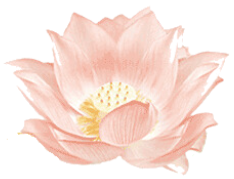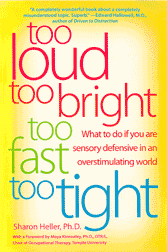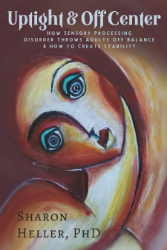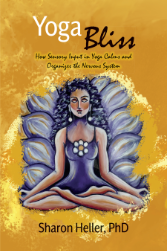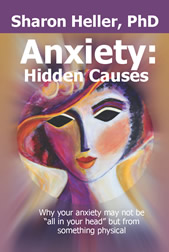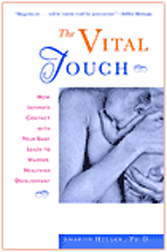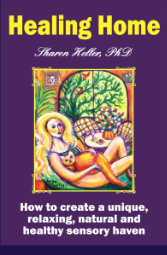Too Loud, Too Bright, Too Fast, Too Tight

Sharon Heller, PhD
Author
Does a tap on the shoulder, loud music, bright lights, strong odors, or a world that moves too quickly send you into a tizzy? If so, you might suffer from sensory defensiveness (hypersensitivity to stimuli), a common affliction in which people react to harmless sensation not just as a distracting hindrance, but with severe annoyance to a potentially dangerous threat.
Until now, the treatment for sensory defensiveness has been successfully implemented in children with sensory processing disorder, who suffer this affliction in the extreme. In adults, the disorder has generally been unidentified, leaving sufferers to think they are either overstimulated, stressed, weird, or crazy. Never knowing why or what they can do about it, sufferers live out their lives constantly agitated, anxious, and unhappy. With Too Loud, Too Bright, Too Fast, Too Tight, they have a name for their affliction, along with extensive information, and solutions.
Uptight & Off Center

Sharon Heller, PhD
Author
Do you feel uptight, anxious and off center—perhaps you are spacey, confused, distracted and disorganized; or impulsive, compulsive, or clumsy?
If so, you may have sensory processing disorder (SPD), a common, though relatively unknown condition in which sensory messages get scrambled in the brain and you cannot make accurate sense of, or respond appropriately to your world.
Uptight and Off Center will help you discover the symptoms, causes and many treatments for SPD. It will teach you how to implement a sensory diet for your unique nervous system by implementing sensorimotor activities and mind-body interventions. These interventions will rewire your brain to enable you to take better control over your life. Over time, this will translate into being more balanced, upbeat, productive, energetic, and loving.
Yoga Bliss

Sharon Heller, PhD
Author
Part memoir, part theory, part research, Yoga Bliss explores why so many yogis experience profound serenity on the mat. Contrary to the popular belief that such bliss is a spiritual experience, Yoga Bliss explores it from a neuroscience perspective. Yoga postures profoundly balance and organize the nervous system because they provide enormous input into our power senses: proprioception (Sense of Body Awareness); the vestibular (Sense of Balance); and deep pressure touch (think bear hug). Strong sensory input from these three primary senses release at once a calming, visceral, and energizing chemical cocktail. The result is profound relaxation, uplifted mood, and sharper thinking.
Woven throughout is Sharon Heller’s own story of how, following head trauma, yoga became her go-to therapy to calm and quiet her nervous system.
Anxiety: Hidden Causes

Sharon Heller, PhD
Author
Do you suffer anxiety or panic? If so, you and your doctors likely assume the primary cause to be psychological and its treatment pills and talk therapy. Yet, in many cases the primary cause of anxiety and panic is physical, not mental. It might be illness, neurological insults, hormone problems, nutritional deficiency, cranial/sacral misalignment, toxic air, water, and food, sensory processing problems, or a combination. In Anxiety: Hidden Causes, you will learn about the many physical causes of anxiety, their identifiable symptoms, and the holistic treatments that seek to eliminate the primary cause(s) to return integrity to your system.
The Vital Touch

Sharon Heller, PhD
Author
Using a lively array of anthropological and sociological sources, The Vital Touch presents a provocative examination of the profoundly important role of touch in infant development—for comfort; for attachment; for sense of security; for brain development. Babes in arms is the way it has been since the dawn of time, and still is in many cultures today.
Healing Home

Sharon Heller, PhD
Author
Is your home cluttered and noisy? Is it crowded with furniture, lacking private spaces and filled with colors and décor too dull, too bright, or too busy? Is it also toxic from paint, furniture, and cleaners loaded with chemicals; and closed in from nature, doors and windows kept shut most of the time? And, importantly, does it lack sufficient expression of individual identity?
If you answered yes to many of these questions, your home is unhealthy and robbing you of an essential means of identity, security, and protection. The result is diminished well-being and happiness. In Healing Home, you will learn how to transform your home into an aesthetic, sensational, healthy, safe haven— a calming, peaceful inner sanctum that reflects your individuality, and revitalizes you to better face the world’s challenges.
